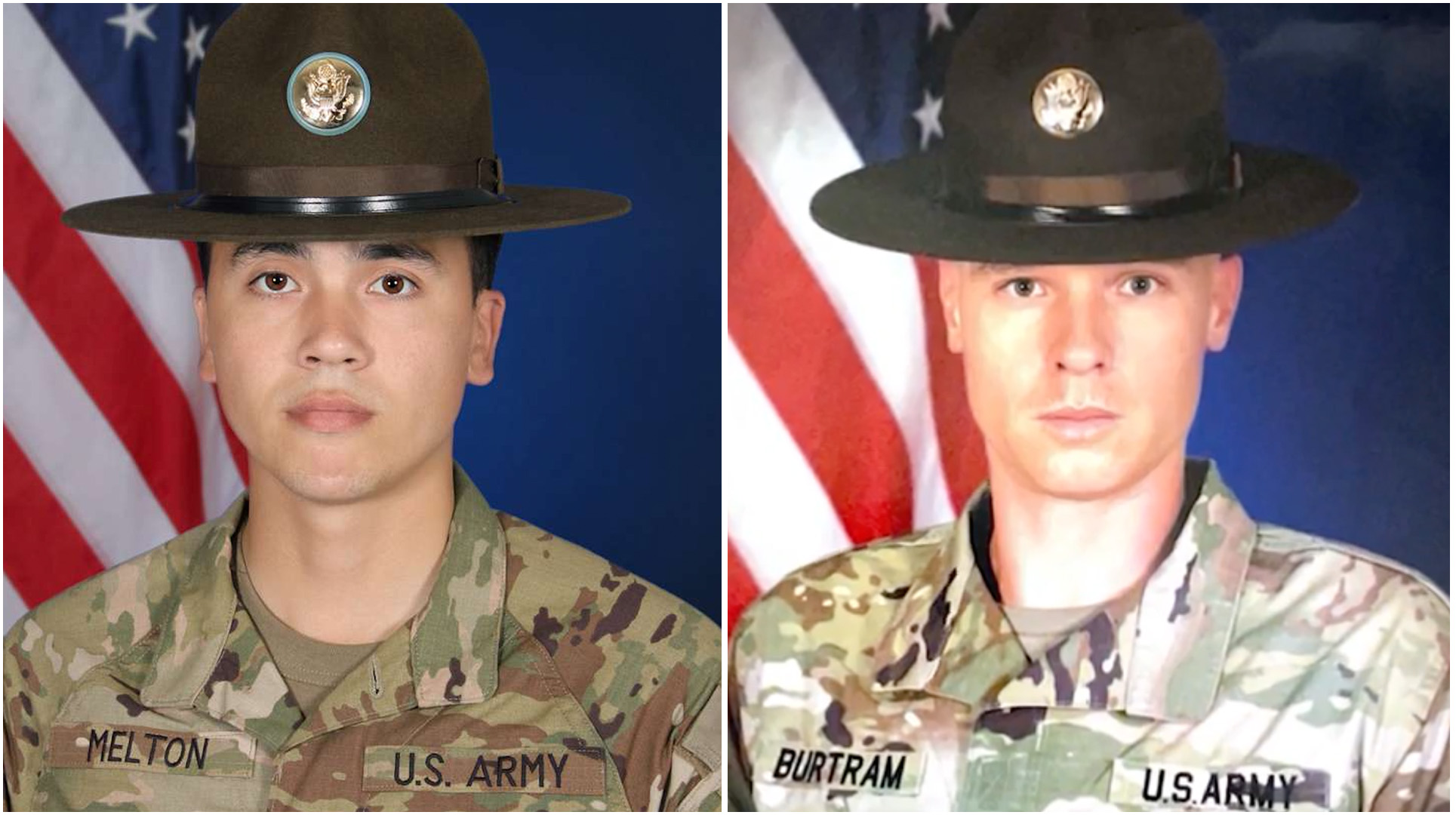

Two Army drill sergeants were found dead within eight days of each other at Fort Jackson, South Carolina, according to officials.
Staff Sgt. Zachary Melton, 30, was found unresponsive inside his car on Saturday, December 16, according to Fort Jackson officials. It came a little over a week after 34-year-old Staff Sgt. Allen Burtram was found dead at Fort Jackson on December 8.
The training units that each drill sergeant belonged to were between training cycles, having just graduated a class of basic trainees.
Melton had been in the Army for 10 years on active duty, with the last three years as a drill sergeant at the base. Melton’s unit graduated their last basic training cycle two days before he was discovered.
Burtram had been in the Army for 12 years and served as a drill sergeant for the last 18 months. Burtram’s unit graduated its last basic training cycle on Nov. 30, roughly a week before his body was found after failing to report to work. Fort Jackson Emergency Medical Services were called and pronounced him deceased shortly after their arrival.
“As a Fort Jackson community, we are mourning the tragic loss of two of our drill sergeants within the past few weeks,” Brig. Gen. Jason E. Kelly, Fort Jackson commanding general, said. “While there are several ongoing investigations into the specifics of each of these deaths, we are taking very deliberate steps to ensure our resiliency resource offerings are adequate and responsive.”
Fort Jackson is the Army’s main Basic Combat Training center, training 50% of soldiers and 60% of the Army’s women. Nearly 48,000 soldiers go through basic training and 12,000 undergo advanced training at Fort Jackson each year.
Subscribe to Task & Purpose today. Get the latest military news and culture in your inbox daily.
Drill sergeants hold one of the Army’s most iconic jobs, famously pushing generations of civilian recruits through stress-filled days of boot camp under distinctive wide-brimmed campaign hats. Drill sergeants train 68,000 recruits each year across the Army through Initial Entry Training for recruits, instructing and assisting with training for physical fitness, military bearing, personal hygiene, first aid, drill and ceremonies, basic rifle marksmanship, and equipment maintenance. There are over 2,100 active duty and 1,900 reserve component drill sergeants with approximately 3,380 males and 635 females, according to Army Center for Initial Military Training.
Soldiers who volunteer for drill sergeant duty serve a minimum tour of two years and work demanding schedules. Drill sergeants typically arrive at work before trainees are awake and do not leave until they go to bed. This translates to a 15-hour work day for an average work week of 6.4 days, according to a 2021 study of almost 900 Army drill sergeants approved by the Walter Reed Army Institute of Research Institutional Review Board.
Researchers found that the most common stressors among the drill sergeants they surveyed included finding time to exercise, lack of sleep, and long work hours. They also found that behavioral health problems and low morale increased the longer they worked as drill sergeants, with those factors peaking within the first 13-18 months.
Another stress factor that researchers discovered from interviews was drill sergeants’ frustrations over pressure to get the maximum number of recruits to graduate, regardless of their attitudes and abilities. Drill sergeants “felt that graduating unsuitable trainees would degrade the Army and endanger the lives of their fellow soldiers,” according to the study.
The cause of death of the Fort Jackson soldiers has not been released. But the nature of being a boot camp drill instructor — a job the Army refers to as a ‘drill sergeant’ — across the military can be high demand and put a great amount of pressure on them as individuals, according to Craig Bryan, a clinical psychologist, and active duty veteran. His research primarily focuses on suicide in the military and he was part of Defense Secretary Lloyd Austin’s Suicide Prevention Response Independent Review Committee.
“You’re expected to perform at a high level. Failure is not an option. If you don’t do your job well then that is a negative reflection on who you are as a person,” Bryan told Task & Purpose. “I am aware of some research by colleagues that have found that men are much more susceptible to that, especially when their identity is very strongly tied to their career.”
The idea of needing to be perfect or a role model for other recruits can weigh heavily on them, Bryan said. “There’s oftentimes a threat of if you make a mistake if you screw up, does that undermine your authority, your credibility, things like that,” he said.
“When they’re actively working a class of recruits through the system, it’s very high demand. Oftentimes their sleep was reduced. They’re spending time away from their families and then they would come home and sometimes they would struggle to turn off the drill instructor,” he said. “It could create tensions within the family which then escalates overall stress levels.”
The Army’s Criminal Investigation Division is investigating both deaths, according to a press release. Army officials said there was “no apparent evidence of foul play.”
Soldiers, veterans, and family members who need help can call the Military Crisis Line/Veterans Crisis Line at 988, chat at veteranscrisisline.net, or text to 838255.
The latest on Task & Purpose
- US Marine is top student at Royal Marine Commando course
- Legendary Combat Controller from Task Force Dagger dies at 51
- Army must “increase” fitness standards, but can use gender-specific scores
- The Navy’s newest ship is named for a Medal of Honor recipient
- A new Army supercomputer gets a Medal of Honor namesake